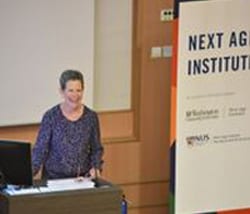Springing from work at the Center for Social Development (CSD), a Financial Capability and Asset Building (FCAB) initiative is underway in Singapore. Soon social workers there will develop knowledge and skills for working with low-income families on their household finances. 
While several colleges and universities in the United States are using the FCAB curriculum, no formal training in FCAB currently exists for social workers in Singapore. Now the Next Age Institute (NAI) and the National University of Singapore (NUS) faculty of Arts and Social Sciences are collaborating to introduce FCAB in Singapore. The curriculum will be piloted with NUS social work undergraduates and about 100 social workers next year.
Citi Foundation, the philanthropic arm of Citigroup, has pledged $130,000 toward the development of the Singapore FCAB curriculum, according to a press release from NUS. The initiative also has the support of the Ministry of Social and Family Development, Singapore Association of Social Workers, National Council of Social Service and Institute for Financial Literacy.
“Citi is proud to partner with the NUS Next Age Institute in this brand new initiative to fill a gap in the community by equipping social workers with the knowledge and skills to assist disadvantaged families on money management matters and access to appropriate financial services,” said Han Kwee Juan, CEO of Citibank Singapore Ltd.
Margaret Sherraden, CSD faculty director for FCAB who is leading the Singapore initiative on behalf of Washington University, said: “It’s wonderful partnering with our social work colleagues in Singapore to translate the FCAB curriculum. We’re learning from each other as we consider how to build financial capability in a very different national context.”
“Low-income families in Singapore today encounter various challenges in managing their financial affairs,” NUS Associate Professor Corinne Ghoh, NAI co-director, said at the February 21 event at NUS to introduce the initiative.
NAI is a McDonnell Academy partnership in applied scholarship between Washington University in St. Louis and NUS. It reviewed research on low-income families in Singapore, statistical trends, and feedback from government agencies and voluntary welfare organizations, Ghoh said, “and we found that while more families are receiving financial help from the government, poor decisions made on financial matters have, in some cases, rendered families homeless.
“Social workers have also shared with us that issues of divorce and debt have brought hardships to low-income families. Furthermore, many low-income families may find it a challenge to navigate through the plethora of financial resources, loans and products available in the market today.”
“Build financial capability and assets for all” is one of 12 Grand Challenges for Social Work in the United States. It may be the first Grand Challenge with international impact, said Michael Sherraden, director of CSD and co-director of NAI.
“We are also working with working with colleagues at Peking University in Beijing to adapt the FCAB curriculum for Mainland China,” he said.